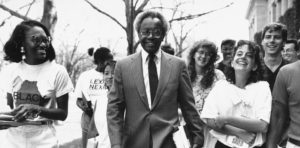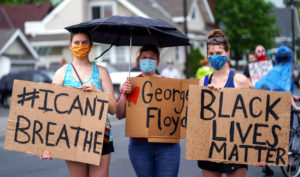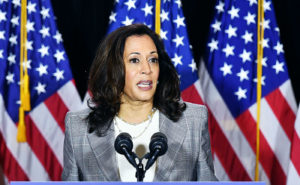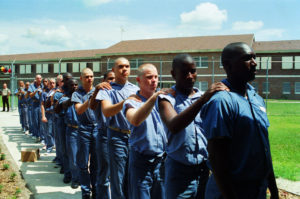Glenn Loury is an economist, author, academic, and one of the most perceptive critics of the progressive upsurge in politics and media.
Freddie Sayers spoke to Glenn about Joe Rogan and Whoopi Goldberg, Joe Biden’s new Supreme Court Justice, and how to fix America’s torturous racial politics.
Joe Biden has pre-announced that his nominee for the Supreme Court will be a black woman. What do you think about this?
I think it is strange. I think no one needs to be apologetic about reacting to that announcement with a bemusement and kind of quizzical ‘what?’ This comes out of Joe Biden’s political ambition, and the character of American politics. During the South Carolina primary when Biden was uncertain of prevailing in the contest for the nomination of the Democratic Party, in 2020, he wanted to appeal to the black vote and so he made this announcement. He announced that his vice presidential selection would be a woman and that his first appointment to the Supreme Court, should he be fortunate enough to have one, would be a black woman.
You could call this craven pandering. I’m bemused by it because it unnecessarily raises questions about the fitness of whomever he might appoint, when he might have simply chosen a black woman as his nominee, and crowed about it after the fact. To avoid casting any doubt over the choice that he would have made, he could have said this is the best, most qualified person that I could find. But in any case, as he’s done it now, he’s limited his range of options to a very small percentage of the total population of people who might have been selected, and, you could say, has put an asterisk by the name of whomever it is that he might ultimately select.
This is, by the way, the Supreme Court of the United States of America, this is the final stopping point for any legal dispute. There are nine justices serving there, the quality of an appointment is not a small matter. We’re not now admitting a marginal student to an elite college campus, we’re selecting the people who are going to govern the country. The President might have engaged in a kind of subtle and tacit preference, rather than crowing about it and making it overt and explicit. It sows a kind of contempt for the standards that we ought to be employing.
Is it right to aim for public bodies to be “representative” of the population?
What do we mean by representativeness and who can represent whom? How many Catholics are there on the US Supreme Court? I’m pretty sure there are more Catholics on the court in proportion than there are Catholics in the population. Dare we ask the question: how many Jews, how about gays, how many openly gay people are on the Supreme Court? How dare we. That’s a rabbit hole that we don’t really want to go down.
And it’s kind of silly because it presupposes that something as superficial as racial identity or sexual orientation is of such fundamental significance that legal counsels must have members present who, when they act out in that context, are acting on behalf of, quote unquote, their group. Well, these individuals are not only women, or blacks, or gays, or Catholics. These are human beings whose humanity supersedes and reaches beyond the categories that we might impose on them.
You were the first African American to become a tenured professor at Harvard. Would you have felt differently about this achievement had the governors at Harvard pre-announced before selecting you that they were going to choose someone of African American heritage?
My appointment as professor of economics at Harvard, which happened in 1982, was accompanied by an initiative at Harvard to enhance the quality of the Afro American Studies department there. I was jointly appointed: economics and Afro American Studies. I was 33 years old. It would have been entirely fair, for some outside observer looking at that to say: “Oh, well, fine. But if he hadn’t been black, they wouldn’t have appointed him.” That’s probably true. So such is the condition that we find ourselves in.
How do you think someone like Whoopi Goldberg can get to the point where said that the Holocaust was not about race?
I assume it’s because she thinks Jews are white. I would chalk that up to ignorance and naïveté — just not being immersed in the long history of modern Europe and anti Semitism and the ideology of Nazism, in which the notion of race had a very particular meaning. I think Whoopi just didn’t appreciate the actual meaning of the word race, in the context in which the Holocaust arose, revealing her ignorance. She ought not to have put it that way. It is a misstatement or mischaracterisation to say that the Holocaust was not about race — it just wasn’t about ‘race’ in the way in which we in the United States might be talking about race.
One finds anti-Semitism not only on the far-Right, with ‘Jews will not replace us’ kind of sentiments, but also in ethnic minority communities. Especially among African Americans, there’s quite a bit of anti-Semitism; there are attacks on Jewish interests. The Reverend Al Sharpton, a prominent civil rights leader, got his start in part by demagoguery over incidents in which there was conflict between blacks and Jews. He has a history in which I think anti-semitism would be a fair descriptor.
Why is there not more sympathy for the Asian community among progressive activists?
The Asians are called a model minority — people say that sardonically. And of course, the subtle implication there is that you must be anti-black if you compare blacks to Asians, and you find the blacks wanting — or anti-Latino.
Some of the corruption and decadence of the legacy population here, black and white, in American society, is exposed by Asian success. They expose the lack of depth and seriousness of too many of our people by their assiduous self application, and their excellence in the mastery of the currency of the modern world. I’m talking about calculus, I’m talking about biochemistry.
Do you think this kind of thinking actually makes racial tensions worse?
So George Floyd is killed — murdered, a jury has spoken — by Derek Chauvin in Minneapolis, in 2020. A policeman inappropriately applying force, he had his knee on the man’s neck, the man expires. Was that a racial incident? Now the police officer was white, the man was killed, George Floyd was black — it became a racial incident. A whole movement was launched or abetted by the racial characterisation of that incident. But why should we understand it as a racial incident?
There is very little evidence at all, if any, that Chauvin was motivated by racial animus when he acted. And on the victim side, George Floyd, the fact that a policeman might over use his power and harm a citizen — that’s something that happens to white people, too. There are cases parallel to the George Floyd case in which the victim has been white, which have not occasioned national attention. So that’s one thing.
But the other thing that I would say is that by cultivating a practice of looking at such incidents in racial terms, invites a parallel practice of looking at criminal victimisation of citizens in racial terms. You want to count the number of white cops who have killed unarmed black men, somebody is going to start counting the number of black murderers who have abused, black carjackers who have robbed and threatened, black assaulters who have bludgeoned and beaten white people. There are an endless number of such cases.
There is enough racial blame to go around, and I’d hate to live in a country in which when a white person was victimised by a black criminal, the first words out of their mouth were “a black criminal victimised me”. That’s not good for black people, because there are many black criminals. And that’s not good for our country because the issue is a criminal victimising a person; the criminal’s blackness doesn’t stand in for his race. He doesn’t represent his race when he acts badly. The victim’s whiteness doesn’t stand in for her race.
What would happen if Affirmative Action is deemed unconstitutional by the Supreme Court?
The Supreme Court has six conservative justices, the majority of whom have publicly stated that they have serious doubts about affirmative action. There’s a very good chance that racial affirmative action will be stricken by the Supreme Court.
If it happens, I assure you, there will be mobs in the streets of this country. No progressive activist is going to take the Supreme Court’s ruling as an opportunity to turn within and consider: “if we want to be at Harvard or the University of North Carolina in larger numbers, why don’t we get busy preparing our youngsters from the cradle to be competitive in this great country that we live in where competition is the coin of the realm?” No, they’re not going to do that. They’re going to interpret that as an anti-black move by a racist Supreme Court. I assure you that it is a disaster and I think we’re headed toward it.
In the past week there has been a big, powerful movement to get Joe Rogan removed from Spotify over historic cases of him using the N-word. What should we make of this?
I’m not going to say the N-word on your programme, but I should be able to say it, it’s just a word. I’m talking about a word — I’m not talking about a slur. And neither was Joe Rogan’s use of it a slur. He wasn’t pointing to a person and calling them one in a way of being a derogation, of an insult. He was speaking about speaking. That is to say he was saying that the word exists and then he was saying the word in the context of quoting someone else’s use of it or whatever.
We have a genre here of music, it’s called hip hop or rap, in which the word is used regularly. And they are not using it as a slur either. It’s a part of the English language. Now, this thing that we’re doing here — where we’re making the utterance of certain sounds an indication of a person’s racism, and then seeking to cancel people for it being revealed that they uttered sounds, without any reference to their intent — is a bizarre phenomenon.
And I think that it’s actually not a sign of strength, by the people, black people, who insist that the sound of the word is so injurious to them. I think it’s a sign of their weakness. There’s something almost pathetic about requiring people to indulge you by not making certain sounds with their mouth because hearing it reminds you of lynching, of nightriders coming down on black people who are defenceless and are being set upon and whatnot.
It seems like a lot of the voices that were most upset about this were white. And it seems like more of an intra-elite power battle to do with the nature of the media, in which the race issue is used as a battering ram. What do you think?
Who are those people who listen to Joe Rogan? They are mostly not latte-sipping, National Public Radio-listening, coastal elites in New York City or Washington DC or San Francisco or whatever. They are mostly, or more often than not, male, more often than not, white. There’s some truck drivers among them. There’s some Trump voters among them.
So this culture war that’s well-advanced here in the United States in which we are in effect, mutually contemptuous of one another based upon what camp we belong in — Joe Rogan is right at the centre of it and his audience substantially is on the ‘wrong side’ from a progressive’s point of view. A lot of this enmity directed toward Rogan is really directed toward his audience.
How do we make it better?
I’d like to tone down the emphasis on race and be more concerned about the humanity of people. If we want to talk about disadvantage, poverty and the lack of wealth in America, there are more poor white people than there are black people. And anything worth doing, whether it be reform of education, or changes in the tax laws or extension of the welfare state programmes, anything worth doing to help black people is worth doing to help people who are in need of of help. I would have our arguments, that is our African American arguments, couched in broad, humanistic terms. And I think that less attention to racial identity and more attention to human common need is healthy for the country.
This transcript has been lightly edited.
Disclaimer
Some of the posts we share are controversial and we do not necessarily agree with them in the whole extend. Sometimes we agree with the content or part of it but we do not agree with the narration or language. Nevertheless we find them somehow interesting, valuable and/or informative or we share them, because we strongly believe in freedom of speech, free press and journalism. We strongly encourage you to have a critical approach to all the content, do your own research and analysis to build your own opinion.
We would be glad to have your feedback.
Source: UnHerd Read the original article here: https://unherd.com






